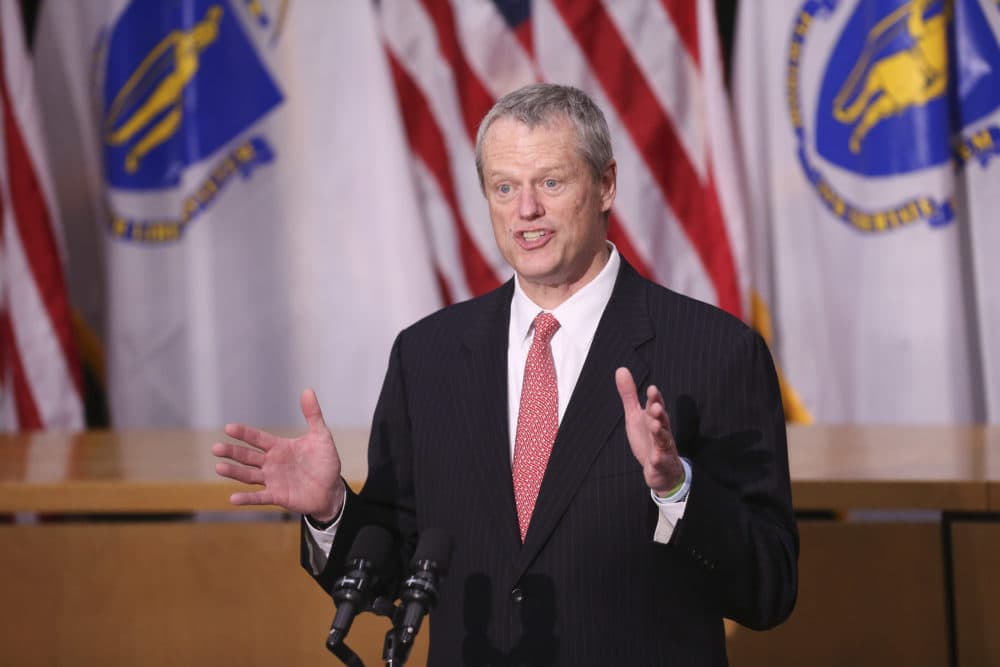Advertisement
Coronavirus Coverage
Baker: Work From Home If You Can, Wear A Mask When Out

Wearing masks and, wherever possible, employees working remotely will be two key strategies to maintaining progress in the fight against COVID-19 as the state begins a gradual process of reviving public activity, Gov. Charlie Baker said Friday.
During his daily coronavirus press conference — potentially his last State House appearance before Monday, when a panel plans to file a report outlining a roadmap toward phased reopening — Baker touted both practices and stressed that the public health threat will require an ongoing vigilant response.
About half of the employees in state government's executive branch have been working remotely since late March, and Baker said his administration this week extended that policy "for the foreseeable future."
He praised large employers such as Blue Cross Blue Shield and Raytheon who have collectively permitted about 150,000 workers to fulfill their duties from home, suggesting other fields where remote work is possible should follow their example.
"The new rules for everybody associated with work in an office are going to require people to create distance," Baker said. "One way you create distance and make it work is by not having the same number of people show up in the same office as you did before, to the extent that companies can find ways to make remote work or work from home work, even if it's only a few days a week."
Baker had pushed for expanded telework before the pandemic hit, including language in his transportation bond bill that would have offered a $2,000-per-worker tax credit to employers who allowed working from home in an attempt to alleviate roadway congestion.
Residents must wear face coverings when they are in public and unable to maintain a safe distance from others under a May 1 executive order. Doing so, Baker said Friday, can reduce the risk of transmission by as much as 80%, protecting both the wearer and those around them.
Researchers believe 7-10% percent of the state's population has been exposed enough to the novel coronavirus to develop antibodies, Baker said, though not all of those people experienced severe illness or even symptoms.
The governor said anywhere from one-fifth to one-half of those infected with the highly infectious virus never display symptoms, despite being able to pass it to others.
"If such a significant portion of the population that gets this virus and is a carrier and can give it to someone else isn't going to be symptomatic, isn't going to know they have it, the most important thing you can do to protect your friends, protect your family, protect anyone you come in contact with is wear a face covering or mask," Baker said.
Baker refrained from offering any details about the phased reopening plan a state panel is set to unveil Monday or the future of his stay-at-home advisory, saying that he would have "a lot more to say" after the weekend.
He announced Friday a 24-hour extension to an executive order requiring non-essential businesses to close. The extra day, Baker said, is a "technical extension" because the order was set to expire at midnight on Sunday, before the panel's report will be public.
Returning to a common theme in his public appearances in recent weeks, Baker said the state's progress out of the status quo must be deliberate and careful to balance economic and public health needs.
"Some people are going to say it's too slow and some people are going to say it's too fast," he said. "I understand and respect that. But this is our idea of the best shot we have at continuing to make progress and not giving the virus a chance to get back out of the barn."
Officials launched an online portal Friday listing 250 sites across Massachusetts where residents can get tested for COVID-19. The state will also partner with Walmart to open testing locations in store parking lots in Salem, Brockton, Quincy and Plymouth.
Each site will be able to test 40 to 50 people a day, "so that's about an additional 600 tests a week," Health and Human Services Secretary Marylou Sudders said at the press conference. "The site will use a self-administered nasal swab test that will allow those being tested to swab their own nose on site while in their vehicles and observed by a trained medical professional to ensure that the sample is taken correctly."
The administration has targeted increased COVID-19 testing capacity and availability as another key feature in its attempts to keep the virus at bay in the long term. Baker on Thursday said he wants laboratories to be able to conduct 45,000 tests per day in July and 75,000 tests per day in December.
Cities and towns in Massachusetts, which face significant budget pressures due to a drop in tax revenues amid the economic slowdown, will soon get a significant boost from $502 million in federal relief funding. Plymouth County will also receive $90 million, while the city of Boston will receive $121 million in additional funding, Baker said Friday.
The funding is about 25%of what Massachusetts has received from the coronavirus relief fund Congress created to offset COVID-19 financial strain.
A new "Phase Four" bill the U.S. House of Representatives appears poised to approve Friday would direct another $12 billion toward Massachusetts state government, according to Rep. Lori Trahan.
However, the legislation has little support from Republicans that control the Senate. White House Press Secretary Kayleigh McEnany on Friday said President Donald Trump views the $3 trillion House bill as a "nonstarter."